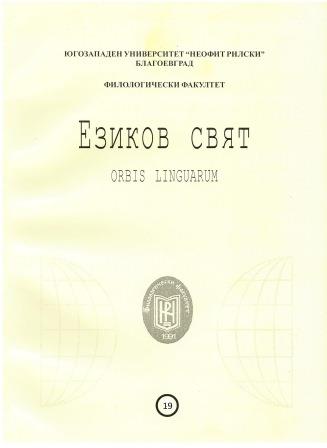ИЗРАЗЯВАНЕ НА ПОДБУДИТЕЛНОСТ В КОРЕЙСКИЯ И БЪЛГАРСКИЯ ЕЗИК
EXPRESSION OF INDUCEMENT IN KOREAN AND BULGARIAN
Author(s): Eunnarae ChoSubject(s): Language and Literature Studies, Theoretical Linguistics, Morphology, Comparative Linguistics, Philology
Published by: ЮГОЗАПАДЕН УНИВЕРСИТЕТ »НЕОФИТ РИЛСКИ«
Keywords: deontic modality; inducement; direct speech act; indirect speech act; illocutionary act; 6-grade honorification system in Korean; Korean-Bulgarian comparative study
Summary/Abstract: This article attempts to present some means of expressing inducement in Korean and Bulgarian and to suggest some features discovered in the translation corpus, composed of five original Korean novels and their translations in Bulgarian. Unlike imperative mood, which is a grammatically concretized notion of deontic modality, inducement is a complex unity formed by various elements such as morphological, syntactic and lexical elements. Therefore, it can be realized both directly and indirectly through the means, which express / do not express inducement in its own form. As for the direct way, Bulgarian has a synthetic and an analytic form. Korean has only a synthetic form, but it has six imperative endings, differing in terms of formality and politeness. Regarding the indirect way, some means like interrogative sentences with the verb in indicative mood and declarative sentences with modal verb are actively used in both languages, while others are used only in Bulgarian. For example, the use of a declarative sentence with a future tense verb in the indicative mood for the purpose of expressing inducement is clearly confirmed in Bulgarian, but in Korean this kind of sentence does not perform the same function at all. From the studied translation materials five main asymmetric features have been found – in the person of the addressee, the voice of the sentence, the way of expressing the inducement, the sentence structure and the way of strengthening the persistence.
Journal: Езиков свят - Orbis Linguarum
- Issue Year: 19/2021
- Issue No: 3
- Page Range: 042-051
- Page Count: 10
- Language: Bulgarian

